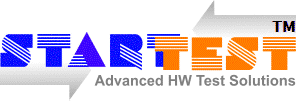 |
BSDL Silicon Validation
Our BSDL Silicon Validation service verifies the accuracy of IEEE 1149.1/1149.6 (dot-1 / dot-6) BSDL files of a semiconductor device (large-scale ASIC and other high-density integrated circuits) both against actual silicon and syntactically and semantically, as well as eliminates a significant support issue for semiconductor suppliers. The quality of BSDL files of your chips is essential to improving the testability of Printed Circuit Boards and systems for hardware manufacturers. When a BSDL file is inaccurate or the implementation of Boundary-Scan (JTAG) in a device is poorly executed, testing or programming the device will require additional time and effort to troubleshoot. Moreover, in the worst case, an inaccurate BSDL file will reduce Boundary-Scan (JTAG) test coverage in every product where the device is designed-in. Once a BSDL file has been syntactically and semantically validated and first samples of the semiconductor device have been produced, the accuracy of the BSDL file can be verified against actual silicon with StarTest™'s BSDL Silicon Validation Service. The device-under-test (DUT) is placed in a fixture or assembled on an intended BSDL Validation Board (BVB) that provides proper Power and Ground, Boundary-Scan (JTAG) access to each I/O, access to the TAP pins (/TRST, TMS, TCK, TDI, and TDO) and static control of compliance enable pins (if applicable). The BVB provides abundant JTAG test coverage for even the highest density BGA packages, as well as Multi-Chip-Modules (MCM) and System-on-Chip (SOC) designs. Utilizing the high-speed JTAG controller, the BVB achieves TCK speeds up to 70 MHz and runs against the silicon both gated TCK and free-running TCK. The BVB also offers excellent flexibility due to its four banks of adjustable voltage levels. The BSDL Silicon Validation is performed for the five worldwide most usable JTAG vendor platforms:
The maximum stable TCK frequency for each JTAG platform hardware will be validated. You can supply your customer the BSDL file with the following heading as the result of the validation: This BSDL has been successfully validated by StarTest™ validation process;for the IEEE 1149.1 / IEEE 1149.6 compliance with the following; JTAG vendor platforms:
A test sequence is generated for the BVB to empirically validate that its embedded JTAG/Boundary-Scan capabilities are described accurately in its BSDL file. The test consisting of:
The StarTest™ personnel will perform PRELOAD/EXTEST instructions for each I/O of your semiconductor device to
verify the accuracy of the contents of the BSDL file and to validate The pin-specific tests are the following:
The BVB is also intended for the IEEE 1149.6 (dot-6, Advanced EXTEST) Standard BSDL Silicon Validation. The 1149.6 BSDL Validation process consisting of:
We trust you will find it helpful in improving the quality of your BSDL files and silicon. Our service can quickly spot JTAG insertion and BSDL errors and is an excellent way to prevent Boundary-Scan (JTAG) testability problems in the field. Until now, very expensive semiconductor testers and test fixtures were used to perform a semiconduc-tor device BSDL verification functions. Our service performs most of these functions at a fraction of the cost. We would be pleased to discuss any of your evaluation or reference
|
|
| Site map | About Us | Solutions | Products | StarTest™ Library | Partners and Customers | Support | Monograph | ||
| Contact Webmaster |
© StarTest™. All rights reserved |
|

 EXPERIENCED TEST EXPERTS
EXPERIENCED TEST EXPERTS